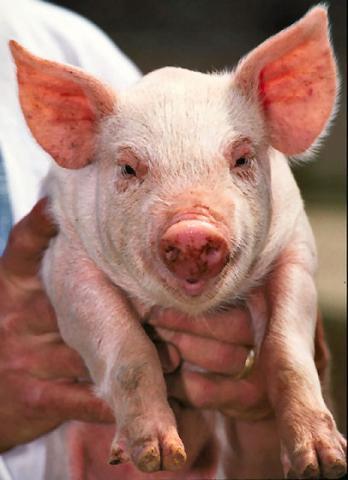A growing cluster of influenza cases in Ohio and Indiana have
been traced by the Centers for Disease Control and Prevention (CDC) to
pigs on display at agricultural fairs. The virus, a variant of Influenza
A, H3N2v, is being contracted by humans coming into contact with sick
pigs. Pig (Public Domain Image)
Pig (Public Domain Image)
At least 80% of the cases of flu have been traced back to direct contact with pigs -- in most cases people had been to see animals at county fairs. This is not a food-borne illness and you cannot get it from eating pork. You can, however, catch it from contact with infected animals.
Should you end up going to an event where pigs are present, the CDC recommends some simple ways to help prevent infection. One is to wash your hands well with soap and water before and after exposure to the animals, and to avoid ingesting food or drink while in these areas. Another is for high risk individuals, such as pregnant women, small children, the elderly, or those with chronic diseases, to avoid animal areas altogether. If you begin to develop symptoms after attending a fair, contact your doctor immediately.
Fortunately, this strain of the flu does not appear to be very contagious. However, influenza is a very changeable disease and the virus is constantly evolving. Every year new viruses and variants appear in both humans and animals. Right now the virus moves easily from pigs to people, but it doesn't appear to move easily between people. Scientists at the CDC will be watching to see if it evolves to the point where it will transmit easily between humans.
Officials believe the H3N2 virus commonly found in pigs, managed to add a gene from the H1N1 flu virus that caused a world-wide pandemic among humans three years ago. That gene made it possible for the virus to be transmitted from pigs to people.
This particular strain of flu is different enough from the regular seasonal influenza that the current flu vaccine won't provide protection. A possible human vaccine for H3N2v will undergo trials this year.
Source: USA Today

